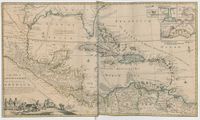"Just a lovely little jewel floating on fair Carib's breast; must have been part of Eden, it's so full of peace and rest..."
Our reverie of home, our imagination of how it was and how it remains, often involves nature indigenous to that home. From the tree-lined streets of Graham Greene's childhood-formed self to Maya Angelou's reference to carried road dust, to John Cleese's first memory of gazing up at a chestnut tree. We endow physical aspects, like nature's detail, to memory so we can anchor ourselves in it.
The nature of a home place, however, is complicated for those transplanted to new lands in a diaspora, or think of their land as a means of power and wealth for others. Within the intensely varied poetic gifts of Una Marson (February 6, 1905 – May 6, 1965) are a smattering of beautiful, and unexpectedly bold poems that celebrate the natural beauty of her Jamaican homeland and in doing so, pass its ownership to those who adore it, rather than those who colonized it.
Jamaica
Just a lovely little jewel floating on fair Carib's breast;
All a-glittering in her verdue ‘neath a blazing tropic sky.
Must have been part of Eden, it's so full of peace and rest.
And the flowers in their splendour make you feel it’s good to die
In a spot that’s so near heaven where one never feels depressed,
‘Cause Dame Nature makes you lazy and Dame Fortune lingers nigh,
And you feel just like a fledgling in your mother’s cosy nest.
Marson was born in Jamaica, where she practiced both journalism and poetry at a young age and even edited a national publication. She moved to England like many Afro-Caribbean Jamaicans, in 1932, where she continued to write poetry and feminist, anti-racist, and anti-colonial essays. Her work was published over many years but most after she had moved to England and thus, the poems melt the two "lands" known to her.
 An 18th-century map of the colonization of Jamaica and the Caribbean, using coloured lines to highlight the areas controlled by Spain, England, France, and Holland. The British Library.
An 18th-century map of the colonization of Jamaica and the Caribbean, using coloured lines to highlight the areas controlled by Spain, England, France, and Holland. The British Library.Marson's reference to 'Eden' in the above poem, "Jamaica," parallels the word's usage in Shakespeare's Richard III: "This royal throne of kings, this scepter’d isle, This earth of majesty, this seat of Mars, This other Eden." But while Shakespeare dotes on his homeland, England, Marson reclaims the 'other Eden' for her beloved homeland, Jamaica.
Occasionally Marson's references to nature of her homeland are specific, detailed:
That my lone heart is homing.
I might sing of fragrant Myrtle blossoms
Whiter than snow and sweeter than honey,
Of pink and white June roses,
Of Jessamines, Hibiscus, Begonias,
Of Bougainvillea and Cassia,
But the Flaming Poinciana
Calls to me across the distance
Calling, calling me home.
From "Home Place"
And this blooming ode to the Hibiscus, a wide-spread, and visually sumptuous Caribbean flower as a means of branding Marson's remembered neighborhoods.
Fair Hibiscus oft you linger
In the gardens of the poor
Bringing joy and cheer and brightness
To the peasant's lowly door.
There the blossoms bloom in splendor
Telling all that pass you by
The earth's beauty and earth's gladness
To the poorest heart is nigh.
From "To the HIBISCUS"
The specific natured beauty in these two poems notwithstanding, Marson's more typical treatment of the nature of her homeland is a nostalgic, hazy-hewed rearview: more idealized than specific. Indeed the first lines of her poem "Nostalgia" are: "I will arise and go again to my fair Tropic Isle... And sit beneath the palm trees that there forever smile." Nostalgia and nature are deeply connected.
In these lines of "In Jamaica", a poem published a year after Marson's original Jamaica poem, do we imagine she writes the lines while actually in Jamaica, or while imagining she is there? Does vantage point matter when one's homeland is so beautifully idealized and even reclaimed?
O, it's a wonderful life in Jamaica
For the tourists who visit this shore,
There's golf, there's dancing and swimming
And charms that they ne'er saw before
They call it a garden of Eden,
they love the fair hills of St. Ann,
And they say on the white sands of Mo. Bay
they get such a wonderful tan!
O, there's beauty in almost every country,
And scenes that bring thrills of delight,
But there's no place like sunny Jamaica,
And no people whose hearts are so light,
Should I leave these fair shores for another,
Be that land yet the fairest of all,
I should pine for the hills of Jamaica,
And hasten to answer her call.
From "In Jamaica"
During the Second World War, French patriots asked philosopher Simone Weil how France, as a nation embattled by occupation and psychological diminution, could move forward. Weil tackled the issue of nationalism with a sensitive argument that to feel connected to one's country, one must feel like he belongs in that country. To be rooted, Weil noted in her posthumous published essay, was the deepest need of the soul. Marson would likely agree with her European contemporary and she used her delicate and enthusiastic poetic gifts to convey the complexity of this very need. Read more in Una Marson Selected Poems, considerately presented and introduced by Alison Donnell.

